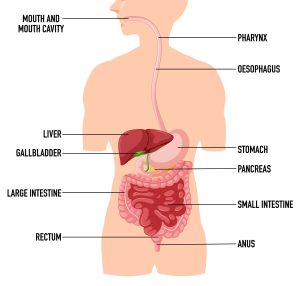Digestion
What is the Digestive System?
The digestive system is responsible for breaking down food, absorbing nutrients, and removing waste from the body. This system is made up of the mouth, esophagus, liver, stomach, gallbladder, pancreas, large intestine, small intestine, and anus as shown in the image below. The digestive system is important for giving your body the energy to complete daily tasks.1

Signs and Symptoms of Digestive Issues
There are a few key signs or symptoms that may indicated trouble with your digestive system. These symptoms include: 2
- Abdominal pain
- Constipation
- Diarrhea
- Bloating
Digestive System and Domestic Violence
Individuals who have experienced domestic violence may struggle with digestive issues. These digestive issues may be due to activation of the body’s fight or flight response which slows down or shuts off the digestive system to respond to a potential threat.2 Studies indicate that psychological, physical, or sexual abuse are associated with higher risks of developing functional gastrointestinal disorder (FGID).3
Tips for Healthy Digestion
When it comes to healthy digestion it is first important to observe how often you are pooping. The number of times a person will poop per week will vary for everyone based on diet, age, lifestyle habits, and so much more. On average, most people poop 7x per week (1x/day). 4 Click on the icons below to learn more about healthy lifestyle practices you can incorporate to keep your digestive system moving.5-6
Seeking Medical Help
If you continue to have difficulties with digestion it is important to speak with a healthcare provider. When speaking with a healthcare provider you may find it helpful to organize your thoughts prior to your appointment. Click here for a worksheet to organize your concerns. Questions to consider as you fill out this form:
- What symptoms have you been experiencing?
- How are these symptoms impacting your life?
- How long have you experienced these symptoms?
- What other medical conditions have you been diagnosed with that would be important to inform this provider?
Key Takeaways
- Survivors of domestic violence may experience problems with their digestive system resulting in abdominal pain, constipation, diarrhea, or bloating.
- Strategies to get your digestive system moving include having a well-balanced diet high in fiber, getting exercise, engaging in good sleep habits, and managing stress.
- It’s important to speak with a healthcare provider if you continue to have problems with digestion.
Pooping fewer than three times per week and may appear small or pellet like.
Poop that is loose or watery and last greater than 14 days.
A range of disorders that affect the digestive system that seem to have no known cause and result in abdominal pain and changes in bowel movement (e.g. constipation, diarrhea). Examples of these disorders include irritable bowel syndrome (IBS), functional dyspepsia (FD), etc.
